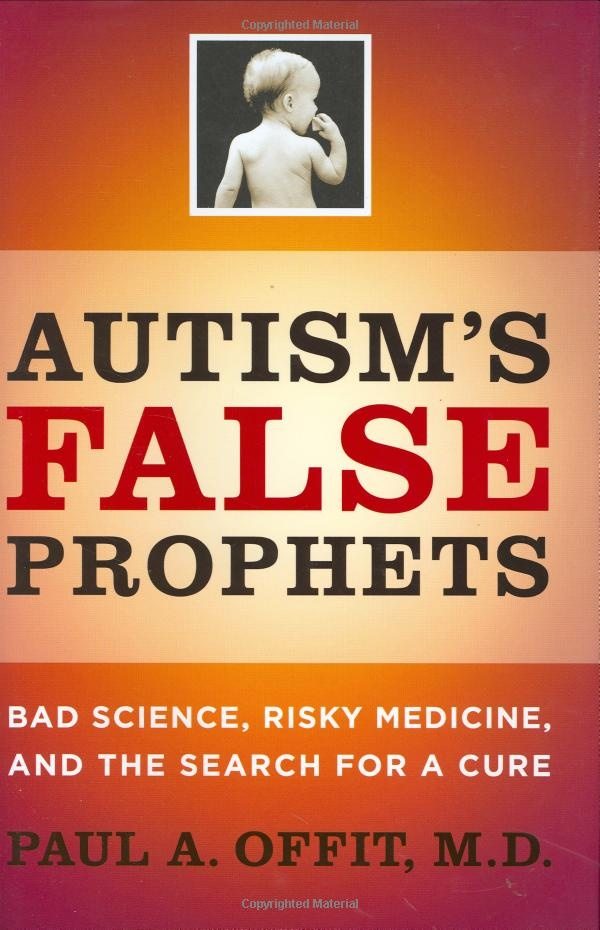Month: September 2008
What’s for Dinner?
Diet advice changes so fast it’s almost a full-time job to keep up with it. Avoid cholesterol; no, avoid saturated fats; no, avoid trans-fats. Avocados are bad; no, avocados are good. Wheat germ is passé; now omega 3s are de rigueur. The supermarket overwhelms us with an embarras de richesses, a confusing superabundance of choices from “organic” to low-sodium. How can we...

Autism’s false prophets revealed
Dr. Paul Offit has written a book about the false prophets of autism, those who promote the idea that vaccines cause autism and those who sell quackery to treat autism, which are often the same people. If you want a good history of how the "vaccines cause autism" myth started, this is a great primer.
Update on the NIH “Trial to Assess Chelation Therapy”
A few days ago, while gathering information for last week’s post about intravenous hydrogen peroxide, I noticed this: ACAM Supports NIH Decision to Suspend TACT Trial September 3, 2008, Laguna Hills, Calif. — The American College for Advancement in Medicine, ACAM today announced its support for the National Institute for Health’s (NIH) decision to suspend patient accrual of the Trial to Assess Chelation...
A Budget of Anecdotes
Anecdotal evidence. An oxymoron? Or a valid approach to understanding data? The problem is there are different kinds of anecdotes, used for different purposes, but the purpose of anecdotes is rarely if ever defined explicitly. Anecdotes are used for one purpose by one speaker/writer but interpreted in a different context by the listener/reader. People love anecdotes, especially if the anecdotes are about...
Acupuncture for Hot Flashes – Or, Why So Many Worthless Acupuncture Studies?
In yet another round of science by press release, a particularly unimpressive acupuncture study is making the rounds of the major news outlets proclaiming that acupuncture works. I guess that is a sort-of answer to my title question – why are so many scientifically worthless acupuncture studies being done? Let’s take a look at this particular study to see why it is...
FDA approval of drugs and transparency in clinical trial results
Note: The reason that I am posting today rather than my usual Monday slot is because the article I discuss here was embargoed until last night. Consequently, I asked Harriet if she would trade days with me this week, and she was kind enough to do so. One thing that science relies on almost absolutely is transparency. Because one of the most...
Misleading Ads in Scientific American
I’m frequently asked, “Is what that ad says really true?” Three recent inquiries have been about products advertised in Scientific American. An ad may acquire a certain cachet by appearing in a prestigious science magazine, but that doesn’t mean much. Scientific American’s editorial standards apparently don’t extend to its advertising department. I remain skeptical about the claims for all three of these:...
Pitfalls in Regulating Physicians. Part 1
I had intended today’s posting to be a summary of a real case faced by a state medical board. It is a case of licensed physicians treating patients with a substandard, dangerous, and unequivocally illegal method. My intent was to use it as an illustration of how difficult it can be for medical boards to discipline such practitioners, even when the treatment...
Trouble in the Library
Anyone attempting a systematic review of the medical literature on sectarian medical systems (“CAM”) starts with a serious disability; the literature itself. The National Library of Medicine still lists abstracts for over 30 “alternative medicine” journals, but more concerning, is my estimate that half or more of the articles on sectarian systems published in standard medical journals range from the erroneous to...
Sometimes science and ethics win out
Yesterday was a good day.It was a good day because it was one of the days that shows that, sometimes, science and ethics do win out after all: CHICAGO (AP) — A government agency has dropped plans for a study of a controversial treatment for autism that critics had called an unethical experiment on children. The National Institute of Mental Health said...

